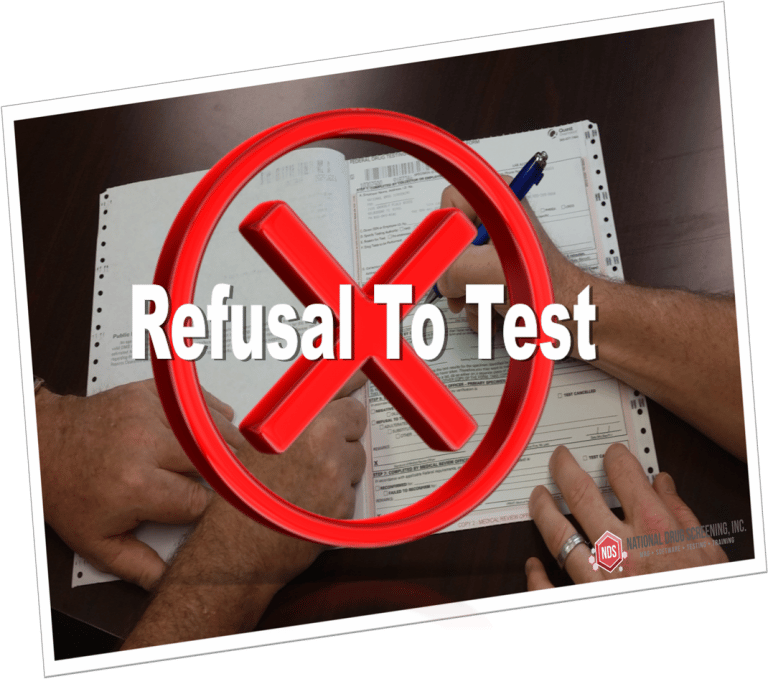While a positive or negative drug test is straight forward, there are situations, such as refusals to test, that require further investigation and documentation. This applies to all employers but is especially true with Federal / Department of Transportation (DOT) regulated testing and there is often confusion when an applicant or employee refuses a DOT required drug or alcohol test.
Who Determines a Refusal?
Some refusals are determined by the medical review officer (MRO) and some by the employer. Typically, if a specimen is not collected and sent to the lab for testing, the employer is responsible for the official determination of the refusal to test. Employers mistakenly believe that collectors make the determination in certain instances, but this is incorrect. Collectors only document the circumstances. The designated employer representative, or DER, makes the final determination when a collector documents a refusal.
There are exceptions. For alcohol testing, the employer is always responsible to make the determination of a refusal. DOT provides a handbook for employees entitled What Employees Need To Know About DOT Drug & Alcohol Testing which defines the refusals for drug testing and for alcohol testing. Employers should make certain that their DOT-regulated employees are given this handbook.
DOT also provides a handbook for employers entitled What Employers Need to Know About DOT Drug and Alcohol Testing. Page 25 provides a chart providing employers with information on what exactly is a refusal to test and who determines it.
Employer Determined Refusals
- Failing to appear at a urine collection site when directed to report
- Failing to remain at the urine collection site
- Failing to provide a urine specimen
- Failing to permit a monitored or observed urine collection
- Failing or declining to take an additional drug test that the employer or collector has directed
- Failing to cooperate with any part of the urine collection process
- For an observed collection, failing to follow the instructions to raise and lower clothing and turn around
- Employee found to possess or wear a prosthetic or other device that could be used to interfere with the collection process
- Employee admission to the collector to having adulterated or substituted the specimen
- Failing to appear for an alcohol test when directed to report
- Failing to remain at the alcohol test site
- Failing to provide an adequate amount of saliva or breath when required
- Failing to undergo a medical examination or evaluation as the employer has directed as part of the insufficient breath procedures
It is important to note that some refusals are determined by the MRO or Medical Review Officer and some by the employer. MRO determined refusals include: Fail to undergo a medical examination or evaluation the MRO or employer has directed, admitting to the MRO to having adulterated or substituted the specimen, Adulterate or substitute a urine specimen, and fail to provide a sufficient amount of urine without sufficient medical explanation.
What’s New and Different for FMCSA Regulated Employers?
For FMCSA regulated employers, there are now additional employer requirements in effect as of January 6, 2020. Refusals to test must be reported to the Clearinghouse; the employer must report the refusals listed above. Documentation of these refusals will also be required to be reported to the Clearinghouse. DER’s will be required to report refusals to test by the close of the third business day following the date on which they obtained that information. Now here is the difficult part, for each refusal to test reported, the following additional information must be reported:
Documentation, including, but not limited to, electronic mail or other contemporaneous records of the time and date the driver was notified to appear at a testing site; and the time, date and testing site location at which the employee was directed to appear, or an affidavit providing evidence of such notification; Documentation, including, but not limited to, electronic mail or other correspondence, or an affidavit, indicating the date the employee was terminated or resigned (if applicable);
Documentation, including, but not limited to, electronic mail or other correspondence, or an affidavit, showing that the C/TPA reporting the violation was designated as a service agent for an employer who employs himself/herself as a driver (Owner Operator) at the time the reported refusal occurred (if applicable); and Documentation, including a certificate of service or other evidence, showing that the employer-provided the employee with all documentation reported regarding the refusal;
In the case of a refusal based on the donors (applicant or donor) admission of adulteration or substitution of the specimen; the employer may report only those admissions made to the specimen collector
Final Thoughts
Employers must be diligent about refusals. Proper documentation will be necessary and critical to compliance. Collector notes and affidavits will be necessary to document what happened at the collection site that caused the employer to make the refusal or non-refusal determination.
Employers will need more detailed interaction with collection site.
About Tom Fulmer
Tom Fulmer, CPCT, is the Vice President of Business Development for National Drug Screening, a nationwide leader in employer drug testing and top provider of drug testing, training, & TPA/Consortium software. Tom writes articles for National publications and presents at conferences. In 2017 and 2018, he won HR.com “Best Customer Service Leadership Training Program” awards and in 2018, he also won a top 10 award for “Best Sales Leadership Training Program”. Tom also conducts training for collectors, employers, and sales and customer service teams.
About National Drug Screening
National Drug Screening (NDS) assists Background screening companies and employers in reducing liability, improving safety, and attracting and retaining better employees by providing drug testing services, supervisor training, Drug free workplace policy development, and other employer resources. NDS provides MRO services, TPA management software, and training to assist other drug testing service providers automate and streamline their processes and increase profitability and service. Top 50 Florida Companies to Watch Award winner 2019.







